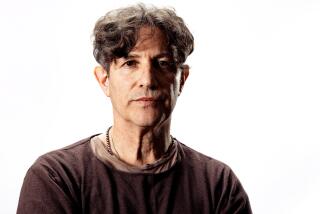Berlin Wild<i> by Elly Welt (Viking: $17.95; 341 pp.) </i>
- Share via
It is Dr. Joseph Bernhardt’s first operation at the Iowa university hospital where, after years as a German immigrant, he has succeeded in obtaining a post as an anesthesiologist. And the first thing he does is to fly into a fury and kick over a water stand.
An attending intern had carelessly stripped the sheet so as to expose the private parts of the sleeping patient, who was there for a back operation. Bernhardt had sat with the patient the night before. He had talked philosophy with him. He had listened to his complaints. He had allowed him wine and whiskey instead of the usual sedatives.
Anesthesiology is a matter of conscience for Bernhardt; it is up to him to stand for the dignity of those he renders unconscious. “He, Joseph Bernhardt, was his patient’s pulse, his heartbeat, the guarantor of his homeostasis.”
And so, he rages to the startled operating-room staff: “This is Mr. LaRiviere. If he were awake and in control, would he wish to expose his genitals to you in such a way?” Then he all but blacks out, seized by a waking nightmare.
This is the alluring start to Elly Welt’s novel about a survivor, not simply of the horror of Nazi Germany, but of an extraordinary anti-world within that horror. Bernhardt, half Jewish, has come through; but he is weighed down into near-suicidal depression by the memory of his family and friends who have not.
We see present-day Bernhardt three times. Once in this beginning section; once in a middle section where he is, in fact, on the point of killing himself; and once at the book’s part-comical and part-moving finale.
The three episodes make a kind of moral framework for the main portion of “Berlin Wild.” This main portion consists of young Bernhardt’s stay at the oddest kind of magical kingdom, operating, in defiance of the Nazis and with their assiduous protection, in the heart of wartime Berlin. This is a paradox, of course, and it is one upon which Welt’s fascinating, highly personal, and somewhat awkward novel is constructed.
The Kaiser Wilhelm Institute is an imposing establishment, part of the Berlin’s fabled Frederick William University. The Institute is devoted to higher scientific research, with sections in biology, chemistry, geology and physics. What furnishes its elite and protected status is the physics section, which houses a small accelerator and Germany’s hopes of achieving nuclear fission.
The paradox stems from the fact that the staff of the institute--so protected as to have its own high-ranking Gestapo man, who is being treated for cancer, to shield it from official snooping--are real scientists.
They include communists, Jews and other banned categories. Their director, Avilov, is an anarchic Russian geneticist who fled Stalin and Lysenko. Their principal brain and wheeler-dealer is the physicist, Kreutzer, the stubbornly German anti-Nazi, who can alternately befuddle and outshout the most persistent regime bureaucrat. One of Kreutzer’s best cowing techniques is to remove, polish and replace three different sets of eyeglasses while addressing his interlocutor.
Joseph was brought up in some privilege, the son of a lawyer father and a doctor mother. The mother is Jewish, however, and the Nazis ban her from practicing medicine. Because of her husband’s position, she is spared arrest for a while, and is allowed to peel potatoes at a factory. Joseph, brilliant at mathematics, is eventually banned from school because of his Jewish blood.
One of his school friends is the son of Avilov; and Joseph is taken into the institute, where he sorts fruit flies and, under Kreutzer, works on radiation experiments.
Welt depicts a world whose wildness lives up to her title (itself a reference to a natural and untampered-with strain of fruit fly). Moving, like a space capsule, through an environment hostile to human existence--the bolts and air locks are the ingenious deceits practiced by the staff on the Nazis outside--a kind of anti-gravity is in operation.
The inmates gorge themselves on the cornmeal that is stocked to feed the fruit flies. They distill pure vodka out of the denatured alcohol shipped in to preserve hundreds of brains of Luftwaffe pilots killed in crashes. They work, play music, hold wild parties, make love in the darkroom, and talk and argue with burning zeal.
It is a technicolor world, as Joseph reflects, compared to the gray Berlin into which he slipped to smuggle food to his mother and his uncle, until these are picked up and sent to a concentration camp. Joseph remains protected by Kreutzer’s bureaucratic manipulations; although for a time, he has to take refuge in a dye factory.
The magic world does not last, of course. Avilov’s son--Joseph’s school friend--is shot as a member of the underground. And eventually, the Russians arrive. Before long, they dismantle the reactor and cart it off to the Soviet Union, taking with them Avilov, Kreutzer and half a dozen others.
Bernhardt’s kingdom has been destroyed. Years later, finally established in a promising career, all his survivor’s guilt comes back to him. He had escaped to the institute before his family perished; he had escaped once more, when the institute perished.
He wanders around his Iowa town, with his worried friends looking for him. He takes refuge in a bar, and works out the mathematics of the bar’s shot glass. A nurse takes him home. Finally, he goes by taxi to a synagogue to say Kaddish for all those whom he had survived. Life sprouts; to pray for the dead is to live.
“Berlin Wild” is the product of inspiration and of a good deal of struggle. The institute portions and the Iowa portions don’t quite mesh. The young Bernhardt has fascinating things to relate, but he himself is little more than a vehicle for his biography. Today’s Bernhardt, full of character and doubts, is quite wonderful; but he doesn’t really grow out of his younger, less tangible self.
More to Read
Sign up for our Book Club newsletter
Get the latest news, events and more from the Los Angeles Times Book Club, and help us get L.A. reading and talking.
You may occasionally receive promotional content from the Los Angeles Times.








